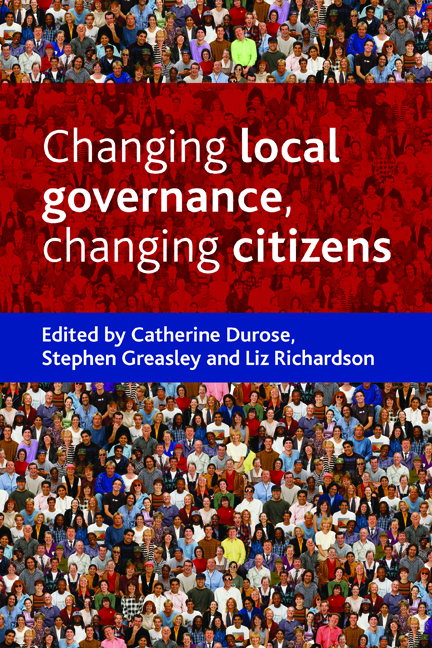Book contents
- Frontmatter
- Dedication
- Contents
- List of boxes and tables
- Acronyms
- Notes on contributors
- Acknowledgments
- Foreword
- Preface
- one Changing local governance, changing citizens: introduction
- two Citizen governance: where it came from, where it’s going
- three ‘Neighbourhood’: a site for policy action, governance … and empowerment?
- four Urban housing market restructuring and the recasting of neighbourhood governance and community
- five Citizen aspirations: women, ethnicity and housing
- six Can we promote cohesion through contact? Intergroup contact and the development of community cohesion
- seven New migrants, citizenship and local governance: ‘Poles’ apart?
- eight Citizens of faith in governance: opportunities, rationales and challenges
- nine Citizens’ reflections on behaviour change policies
- ten Every child’s voice matters?
- eleven e-citizenship: reconstructing the public online
- twelve Conclusion
- Index
Preface
Published online by Cambridge University Press: 16 July 2022
- Frontmatter
- Dedication
- Contents
- List of boxes and tables
- Acronyms
- Notes on contributors
- Acknowledgments
- Foreword
- Preface
- one Changing local governance, changing citizens: introduction
- two Citizen governance: where it came from, where it’s going
- three ‘Neighbourhood’: a site for policy action, governance … and empowerment?
- four Urban housing market restructuring and the recasting of neighbourhood governance and community
- five Citizen aspirations: women, ethnicity and housing
- six Can we promote cohesion through contact? Intergroup contact and the development of community cohesion
- seven New migrants, citizenship and local governance: ‘Poles’ apart?
- eight Citizens of faith in governance: opportunities, rationales and challenges
- nine Citizens’ reflections on behaviour change policies
- ten Every child’s voice matters?
- eleven e-citizenship: reconstructing the public online
- twelve Conclusion
- Index
Summary
This edited collection came about as a result of a series of discussions in internal team meetings, over drinks and around the edges of conferences. We are a collection of academic colleagues who enjoy being engaged in hands-on primary research with citizens, with local government, in neighbourhoods; our active research focus is one of the things that unite us. We are also proud of our links to practitioner and citizen audiences, and the fact that our work tried to bridge the gap between academia and practitioner perspectives. Active as we were, the downside was that some of our work was through small or medium size commissions for a range of clients on myriad topics. These types of pieces of work tended to involve an intense period of fieldwork, then writing up, before moving on to the next piece of paid work. We wanted to have the space to sit back a little from our activity and think through what it amounted to, if anything. Our individual projects appeared incredibly disparate at first glance. But gradually it became clear that some of the same questions, issues and debates came up time and time again in relation to these very disparate pieces of work. We realised we were wrestling with some common questions: was this more of the same or was something new happening in the way that neighbourhoods and areas were being governed? Did citizens really welcome the extra demands being made of them? Had governance activity produced outcomes for citizens, society, or local agencies? What did this mean for how we think about what it means to be a citizen in the UK? The idea for Changing local governance, changing citizens finally crystallised when we searched for other literature on this topic. We found many great books theorising governance and governance changes, but very little that looked at the issue from both governance and citizen perspectives. Much of the theoretical discussion was somewhat abstracted from the day-to-day experiences and engagement of the citizen. Much of the literature on local government focuses on technical and internal changes in decision making and service delivery, neglecting the wider relevance of such discussions to the lives of local people.
- Type
- Chapter
- Information
- Changing Local Governance, Changing Citizens , pp. xxi - xxiiPublisher: Bristol University PressPrint publication year: 2009



